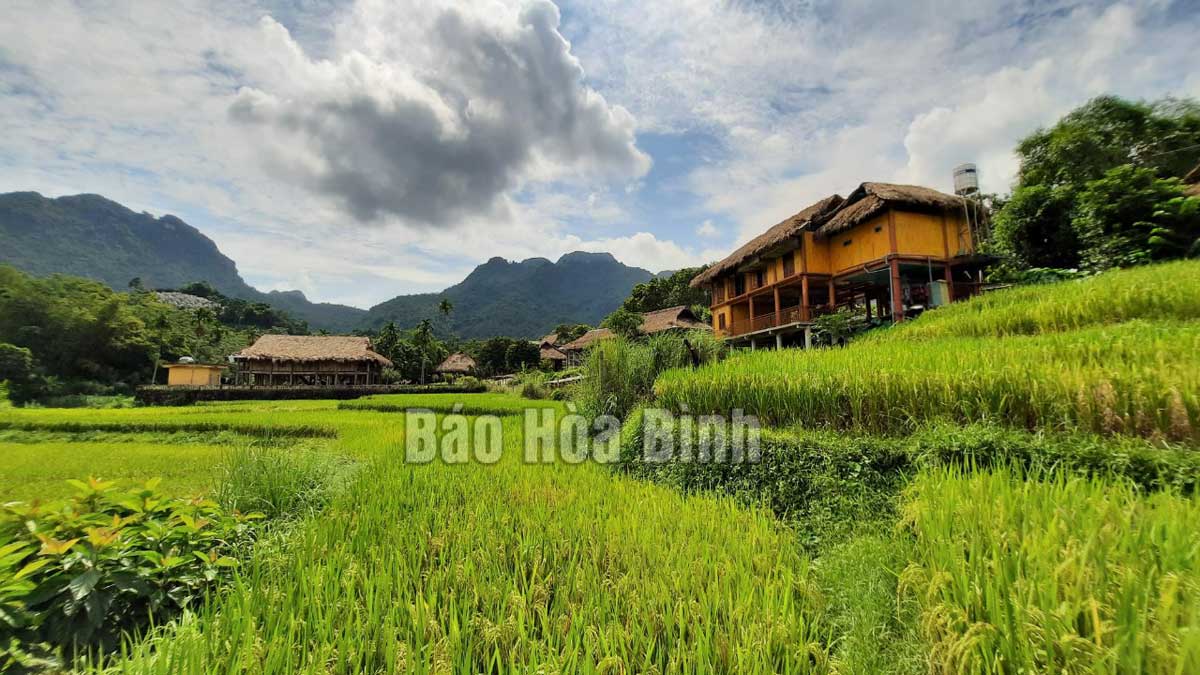
(HBO) – Travelling to Muong Giang Mo village (Mo hamlet at present) in Binh Thanh commune of Hoa Binh’s Cao Phong district in early October, or harvest time, visitors will be impressed by the fragrance and colour of terraced fields shifting from green to yellow.
Mo hamlet is a peaceful place
basked in autumn sunshine. It is a perfect picture of stilt houses amidst
forest and expansive mountains, with chirping birds and gentle flowing streams.
Local people lead a simple and peaceful life and value sincerity.

Mo hamlet in Binh Thanh
commune (Cao Phong district) with traditional stilt houses and pristine
landscape, which is a draw to visitors.
The hamlet is 12km away from
downtown Hoa Binh city. Housing over 100 stilt houses of Muong people, it keeps
local cultural traits intact, from the house shape to daily activities.
It is attractive to foreign
tourists and students as they can explore and enjoy the pure atmosphere and
beautiful landscapes to ease fatigue and worries in life.
Nguyen Thi My, who was among
the first ones in the hamlet to engage in tourism activities, said local people
earn their living mostly from rice cultivation, tree growing and animal
husbandry. In traditional stilt houses, they still keep a traditional daily
life, with many home and working tools made of wood and bamboo, such as
weaving looms, bows and farming tools. Of note, women of Muong group excel in
weaving and making cushions. They often create handmade traditional craft
products to introduce to tourists.
Visitors will be warmly welcome
by locals either on the road or at any stilt houses. They can explore Muong
culture through listening to stories of the hosts. During overnight trips, tourists
will be treated with local specialties of banana wine, corn wine and dishes
like sticky rice, fish, pork, as well as songs and dances of Muong people if
they are interested, to learn about local culture and custom.
Bui Yen Minh, tourism officer
of the culture-sports office of Cao Phong district said that community-based
tourism in Muong Giang Mo village attracts tourists as it successfully
conserves outstanding traditional traits of Muong culture. Together with
pristine landscapes, the village has become a can’t-miss destination in the
journey to discover and explore the Hoa Binh reservoir tourist site./.
Spanning thousands of hectares and winding gracefully along mountain slopes, hillsides, and riverbanks, the terraced rice fields of Lac Son District present a stunning and captivating beauty. This region, renowned for its remarkable terraced landscapes, is also the centre of Hoa Binh Culture known for numerous archaeological sites.
The life of Mong people in Hang Kia and Pa Co communes of Mai Chau district has improved much thanks to tourism development.
The man-made Hoa Binh Lake, with a water surface area of approximately 9,000 hectares and a capacity of 9.45 billion cubic meters, stretches over 200 kilometers from Hoa Binh to Son La provinces. With the goal of developing into a national tourism area, the Hoa Binh Lake tourism area is expected to not only become the largest tourism centre in the province but also one of the 12 key tourist destinations in the northern midland and mountainous region of Vietnam.
Da Bia hamlet, now Duc Phong, in Tien Phong commune, Da Bac district, was once almost isolated from the outside as the only way to the hamlet was to get a boat ride across the Hoa Binh reservoir. However, as its tourism potential has been unleashed, the hamlet has established itself as one of the most attractive destinations on the tourism map. It has even received the ASEAN Community-Based Tourism Awards in 2019.
In the first 9 months of 2024, Mai Chau district, Hoa Binh province welcomed over 684 thousand visitors to visit and relax. In which, over 516 thousand domestic visitors and more than 168 thousand international visitors. Total revenue from tourism is estimated at over 821 billion VND.
Da Bac district, bestowed with stunning landscapes, is developing ecological and resort tourism offerings. Several tourist sites, put into operation this year, has attracted throngs of high-spending and young domestic visitors.



